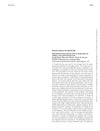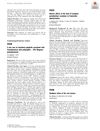 2 citations,
March 2015 in “Hepatitis Monthly”
2 citations,
March 2015 in “Hepatitis Monthly” A woman's hair loss during Hepatitis C treatment with PEG-INF-a-2a and Ribavirin was reversible after stopping the medication.
2 citations,
November 2007 in “Clinics in dermatology” Tofacitinib may be an effective and safe treatment for adolescent alopecia areata.
March 2024 in “Biomedicines” Mesenchymal stem cells show promise for effective skin repair and regeneration.
 February 2024 in “Recima21”
February 2024 in “Recima21” Covid-19 can cause hair loss due to immune and psychological factors.
 January 2024 in “Elsevier eBooks”
January 2024 in “Elsevier eBooks” Increasing regulatory T cells may help treat alopecia areata by reducing autoimmunity and promoting hair growth.
 June 2023 in “British journal of dermatology/British journal of dermatology, Supplement”
June 2023 in “British journal of dermatology/British journal of dermatology, Supplement” A 13-year-old boy had both lichen planus and vitiligo, suggesting a possible link between the two conditions.
 May 2023 in “Sučasna pedìatrìâ. Ukraïna”
May 2023 in “Sučasna pedìatrìâ. Ukraïna” An 11-year-old child with total hair loss may have a genetic autoimmune disease, and the outlook for hair regrowth is not good.
 November 2022 in “Journal of Investigative Dermatology”
November 2022 in “Journal of Investigative Dermatology” Patients with ichthyosis often experience symptoms similar to psoriasis and atopic dermatitis, suggesting that targeted therapies could improve their condition.
 March 2022 in “Egyptian Academic Journal of Biological Sciences. E, Medical Entomology and Parasitology”
March 2022 in “Egyptian Academic Journal of Biological Sciences. E, Medical Entomology and Parasitology” Demodex mites might help skin balance by eating bacteria, but their role in skin disorders is unclear and may involve other factors.
 January 2022 in “Medical research archives”
January 2022 in “Medical research archives” Taking vitamin D might improve life for MS patients and reduce skin side effects from alemtuzumab treatment.
 April 2019 in “Actas Dermo-Sifiliográficas”
April 2019 in “Actas Dermo-Sifiliográficas” The conclusion is that having both Frontal Fibrosing Alopecia and Discoid Lupus Erythematosus may suggest a shared immune response in certain people, and a mix of antimalarial drugs and 5-alfa-reductase inhibitors is recommended for treatment.
 June 2018 in “Journal of Clinical Periodontology”
June 2018 in “Journal of Clinical Periodontology” Finasteride may cause gum problems, but stopping the drug can improve these issues.
 June 2018 in “Journal of Clinical Periodontology”
June 2018 in “Journal of Clinical Periodontology” Finasteride may cause gum side effects in some patients.
November 2015 in “The journal of investigative dermatology. Symposium proceedings/The Journal of investigative dermatology symposium proceedings” Alopecia areata is now understood to be driven by genetic and immune factors.
 June 2018 in “Journal of Clinical Periodontology”
June 2018 in “Journal of Clinical Periodontology” Finasteride can cause gum swelling and bleeding, but stopping the drug helps recovery.
353 citations,
July 2015 in “Molecular immunology” Porcine skin is very similar to human skin, making it a useful model for research.
 December 2023 in “Journal of Cutaneous Immunology and Allergy”
December 2023 in “Journal of Cutaneous Immunology and Allergy” A man developed myasthenia gravis after alopecia areata, and treatment improved his symptoms and stopped hair loss.
 3 citations,
July 1996 in “Clinics in Dermatology”
3 citations,
July 1996 in “Clinics in Dermatology” Cytokines are important for immune responses and treating diseases, but they can cause side effects like fever and skin issues.
 1 citations,
August 2017 in “Semiotica”
1 citations,
August 2017 in “Semiotica” The paper concludes that breast cancer treatment involves complex interactions between medical symptoms, patient experiences, and commercial influences, requiring a holistic approach.
 June 2023 in “Research Square (Research Square)”
June 2023 in “Research Square (Research Square)” Hair loss in male pattern baldness is linked to changes in immune cell behavior around hair follicles.
 28 citations,
August 2001 in “Journal of cutaneous medicine and surgery”
28 citations,
August 2001 in “Journal of cutaneous medicine and surgery” People with Down's syndrome often have more skin problems due to a weak immune system.
 20 citations,
November 2019 in “Current Opinion in Systems Biology”
20 citations,
November 2019 in “Current Opinion in Systems Biology” The document concludes that computational models are useful for understanding immune responses and could improve cancer immunotherapy.
 4 citations,
June 2022 in “BioMed Research International”
4 citations,
June 2022 in “BioMed Research International” Using mesenchymal stem cells or their exosomes is safe for COVID-19 patients and helps improve lung healing and oxygen levels.
4 citations,
September 2012 in “Transplant international” Graft rejection in a hand transplant may trigger hair loss due to autoimmune responses.
 1 citations,
May 2023 in “Prospects in Pharmaceutical Sciences”
1 citations,
May 2023 in “Prospects in Pharmaceutical Sciences” New cytokine-targeted therapies show promise for treating alopecia areata.
 1 citations,
March 2023 in “International journal of rheumatic diseases”
1 citations,
March 2023 in “International journal of rheumatic diseases” Relatives of lupus patients show signs of immune system activity but not full-blown lupus.
 1 citations,
September 2020 in “Journal of the Endocrine Society”
1 citations,
September 2020 in “Journal of the Endocrine Society” Men have worse COVID-19 outcomes than women due to genetic and hormonal differences.
 May 2024 in “Trends in endocrinology and metabolism”
May 2024 in “Trends in endocrinology and metabolism” Iron is essential for many body functions, and its deficiency causes serious health problems.
 January 2024 in “International Journal of Dermatology”
January 2024 in “International Journal of Dermatology” Targeting Interleukin-13 could help treat alopecia areata linked with atopic dermatitis.
Proper nutrition and vitamins can boost the immune system and overall health in older adults.
























